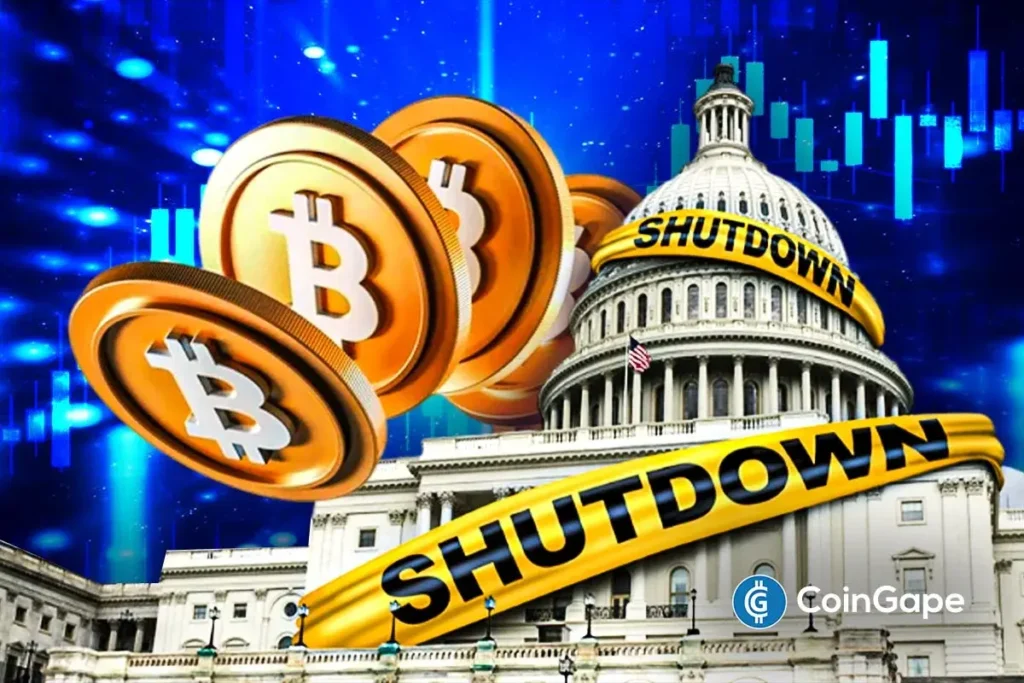Impact of the U.S. Government Shutdown on Bitcoin and Ethereum Prices
As the U.S. government shutdown stretches into its 34th day, marking the longest such event in American history, the cryptocurrency market experiences significant turmoil. Investors are becoming increasingly risk-averse, prompting notable declines in Bitcoin and Ethereum prices. This article will explore the ramifications of the shutdown on cryptocurrency values, the political landscape fueling the impasse, and the reactions from market analysts and investors.
Continued Decline in Cryptocurrency Values
The current political stalemate has resulted in alarming drops in the prices of major cryptocurrencies. According to TradingView data, Bitcoin (BTC) has dropped by 5.6% in just 24 hours, bringing its price to approximately $100,547, marking a four-month low. Ethereum (ETH) fared even worse, declining over 7% and falling below $3,340, which erases its year-to-date gains. In a single week, both major cryptocurrencies have seen their values plummet by nearly 20%, alarming traders and investors who are closely monitoring market trends.
Political Turmoil Affecting the Economy
Senator Bill Hagerty has publicly criticized Senate Democrats for their role in keeping the government shuttered, blaming them for prioritizing political agendas over the well-being of federal employees. He emphasized the plight of more than 1.4 million federal workers who are now missing their second paycheck due to the standoff. The outlook initially seemed optimistic, with White House economic advisor Kevin Hassett predicting a quick resolution. However, as political divisions deepen, that optimism appears increasingly unfounded.
Potential Chaos in Key Sectors
The effects of the ongoing shutdown extend beyond the crypto market. Transportation Secretary Duffy recently voiced concerns that air traffic controllers may soon have to close parts of airspace due to unpaid salaries, which could lead to “mass chaos.” Such disruptions in essential services not only impact daily life but also contribute to broader economic uncertainty. If the shutdown persists another week, the ramifications could escalate, affecting various sectors and stoking fears of prolonged instability in the financial markets.
Growing Concerns of an Extended Shutdown
Palpable anxiety is permeating the market as traders from platforms like Kalshi suggest there is a 59% probability that this shutdown will extend beyond 42 days. This uncertainty has placed strain on institutional and corporate holders of Bitcoin, prompting portfolio adjustments and rebalancing strategies. The potential for prolonged shutdown effects raises questions about market liquidity and investor confidence, adding further pressure to an already volatile crypto landscape.
Institutions Reassess Their Cryptocurrency Holdings
Recent market actions reflect the growing unease among institutional investors. Paris-based Sequans Communications has opted to sell 970 BTC, reducing its holdings from 3,234 to 2,264 BTC, a decision valued at approximately $232 million. The firm labeled this move as a “strategic asset reallocation,” emphasizing that it aims to fortify its balance sheet and mitigate outstanding debts of $94.5 million. Even with the sale, CEO Georges Karam reaffirmed Sequans’ long-term commitment to Bitcoin, illustrating the complex dynamics at play in the crypto investment landscape.
Criticisms from the Gold Sector
Amidst this turmoil, stalwart gold advocate Peter Schiff has amplified his criticisms of Bitcoin’s viability. Citing that Bitcoin has now lost one-third of its value compared to gold since its peak last month, Schiff insinuates that there is significantly more downside potential ahead for Bitcoin. His remarks reflect a broader skepticism towards cryptocurrencies as traditional assets like gold maintain their status as reliable stores of value, especially in uncertain economic climates.
Conclusion
The U.S. government shutdown has unfurled a series of negative consequences across various sectors, most notably impacting the cryptocurrency market. As Bitcoin and Ethereum face urgent declines, the volatility underscores a growing trend where political instability influences market movements. Investors are reassessing their portfolios amid fears of a further prolonged shutdown, while institutional players are strategically reallocating assets. As the situation develops, it will be crucial to monitor both the political and financial landscapes to gauge the potential recovery of cryptocurrency values.


